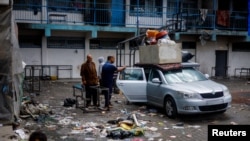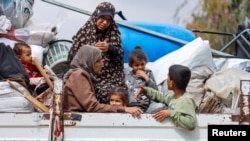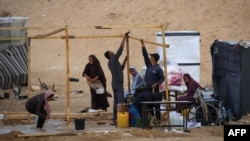Humanitarian aid is dwindling in Gaza as the two main crossings near Rafah, the southern Gaza city, remained closed Monday and aid workers struggled to distribute shrinking supplies and food to hundreds of thousands of displaced Palestinians.
U.N. deputy spokesperson Farhan Haq said during a news briefing Monday that the distribution of humanitarian aid in the enclave has come to a halt.
“There is still no traffic of humanitarian goods going through the Rafah crossing, which is closed,” he said. “And there is still a lack of safe and logistically viable access to the Kerem Shalom crossing. We are trying to get things, including through the Erez crossing, but the amount of stuff traveling has been very small in recent days.”
He added “at this stage we are rationing fuel … we are very low on fuel.”
Haq announced that a staff member with the United Nations Department of Safety and Security (DSS) was killed, and another injured in Gaza when their U.N. vehicle was struck Monday on the way to the European Hospital of Rafah.
“The secretary-general condemns all attacks on U.N. personnel and calls for a full investigation. He sends his condolences to the family of the fallen staff member,” he said.
At a checkpoint between the occupied West Bank and Israel Monday a group of Israeli protesters halted a convoy of aid bound for Gaza. Videos circulating online showed them hurling some of the aid off trucks and destroying it. Police said arrests were made, without elaborating.
Almost the entire population of Gaza relies on humanitarian aid to survive.
Israel considers Rafah as the last stronghold of the militant group Hamas, dismissing concerns from the United States and other allies that a major incursion there would be catastrophic for civilians.
For the past week, the Israeli military has intensified bombardment and other operations in Rafah while ordering the population to evacuate from parts of the city. Israel insists this is a limited operation to destroy the militant infrastructure along Gaza’s border with Egypt.
So far, 360,000 Palestinians, one-fifth of Rafah’s population, has fled since the first evacuation order over the past week. Many of these civilians had been displaced multiple times since the start of the war in Gaza seven months ago, the United Nations' agency for Palestinian refugees said.
Clashes also raged in northern and central Gaza, including the Jabaliya refugee camp.
Israel marked a somber Memorial Day Monday, for the victims of terrorism in Israel and abroad, at Mount Herzl in Jerusalem.
Israelis marked a moment of silence, and in a speech, Prime Minister Benjamin Netanyahu vowed to keep fighting.
"Our war of independence is not over yet. It continues even today. ... We are determined to win this struggle,” he said.
U.S. reaction
U.S. national security adviser Jake Sullivan said during a White House news briefing Monday that President Joe Biden's administration did not view the killings of Palestinians in Gaza by Israel in its war with Hamas as a genocide.
"We do not believe what is happening in Gaza is a genocide. We have been firmly on record rejecting that proposition," Sullivan said.
Sullivan said the United States wants to see Hamas defeated, that Palestinians caught in the middle of the war were in "hell," and that a major military operation by Israel in Rafah would be a mistake.
Biden, who is running for reelection this year, has faced heavy criticism from his own supporters domestically for his support of Israel; some of those critics have accused Israel of committing genocide.
The U.S. State Department said late Sunday that Secretary of State Antony Blinken discussed “U.S. opposition to a major military ground operation in Rafah” as he spoke by telephone with Israeli Defense Minister Yoav Gallant.
The statement said Blinken also reaffirmed the U.S. commitment to “the shared objective of the defeat of Hamas,” while also highlighting the need to protect civilians and urging Gallant to “help address distribution challenges inside of Gaza as Israel pursues Hamas targets.”
Earlier Sunday, Blinken told NBC’s “Meet the Press” show there is no specific Israeli plan to protect the Palestinians or provide sufficient humanitarian aid for them.
“So, the trajectory right now is that [Israel] going into Rafah, even to deal with these remaining [four militant] battalions, especially in the absence of a plan for civilians, risks doing terrible harm to civilians and not solving the problem, a problem that both of us want to solve, which is making sure Hamas cannot again, govern Gaza,” Blinken said.
Blinken noted “we've seen in areas that Israel has cleared in the north, even in Khan Younis, Hamas coming back.”
Biden has paused shipment of 3,500 227-kilogram (500-pound) and 907-kilogram (2,000-pound) bombs to Israel out of concern they could be used in an attack on Rafah.
In addition, Biden said last week that he would halt sending some other offensive weapons to Israel if it launches a full-scale Rafah offensive.
Israeli talks with Hamas for a cease-fire and the release of 100 or so hostages Hamas is still holding have stalled, while Netanyahu has repeatedly said his country will not end the war until it roots out the remaining Hamas militants in Rafah.
Blinken warned of impending chaos in Gaza.
“Israel is on the trajectory, potentially, to inherit an insurgency with many armed Hamas left or if it leaves a vacuum, filled by chaos, filled by anarchy and probably refilled by Hamas,” he said.
“The quickest way for this to end is for Hamas to give up the hostages. We will get a cease-fire that we can build on and build to something more lasting and more durable. The different teams continue to talk,” Blinken said, adding “Hamas purports to be interested in that. Its actions certainly demonstrate the opposite.”
The war was triggered by the October 7 Hamas terror attack on Israel that killed 1,200 people and led to the capture of about 250 hostages according to Israeli officials. Israel’s subsequent counteroffensive in Gaza has killed more than 35,000 Palestinians, according to the Hamas-run Health Ministry in Gaza, which includes civilians and combatants in its count but says most of the dead are women and children.
Some material in this report came from The Associated Press, Agence France-Presse and Reuters.







